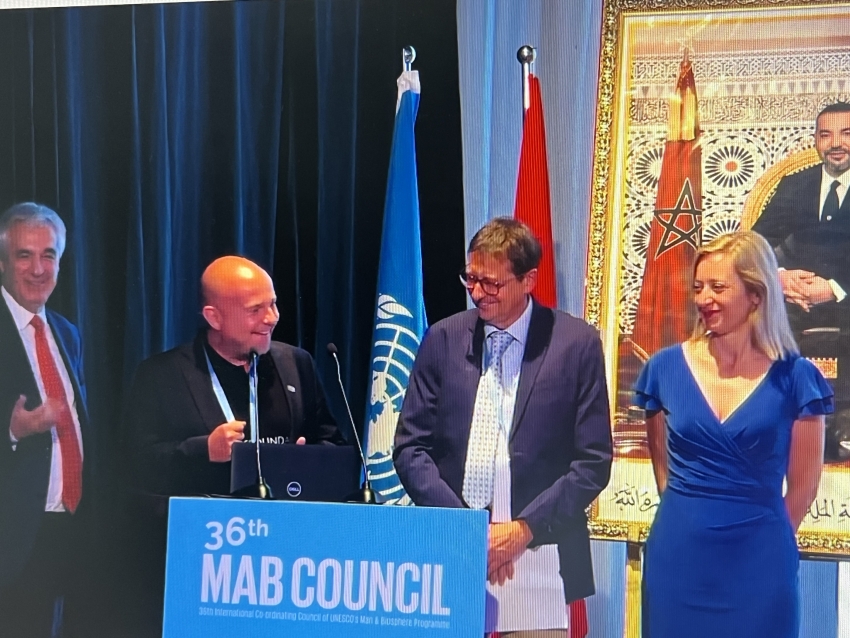The UNESCO MAB programme (https://en.unesco.org/mab) counts 748 Biosphere Reserves worldwide, the transboundary recognitions are "only" 23. With the MAB programme, UNESCO is committed to pursuing the 17 Sustainable Development Goals (SDGs) by asking Biosphere Reserves to work with an equal effort in the field of nature conservation, development of green economies and supporting local communities to be cohesive, inclusive and resilient.
The Julian Alps, on both sides, have already obtained this important result (the Slovenian Alps since 2003 and the Italian Alps since 2019) and on 5 July in Agadir (Morocco) they were jointly recognized as the new transboundary Biosphere Reserve Julian Alps. The recognition as transboundary Biosphere Reserve allows, by transcending national administrative borders, to unify the perimeters of the two current Biosphere Reserves, covering an area of almost 277,000 hectares in total.
The two parks, as coordinators of the national Biosphere Reserves, developed studies and technical analysis for the drafting of the dossier and organised a series of meetings aimed to involve all the stakeholders of the Julian Alps (local authorities, enterprises, associations, the world of education, universities and research bodies,...) in the "construction" of the cross-border reserve.
The nomination process, that began in December 2022 with a Kick-off meeting held in the Slovenian Alpine Museum in Mojstrana (Kranjska Gora - Slovenia), has developed over the past months involving institutions, associations and enterprises of different sectors, both Italian and Slovenian, in a series of 6 thematic meetings. During the process, many stakeholders understood the opportunity that the Julian Alps would gain by becoming a Transboundary Biosphere Reserve, and offered their contribution in terms of expertise and stimulus, as evidenced by the 82 letters of endorsement to candidacy that the Parks received and annexed to the nomination form.
The stakeholders' contribution was fundamental both for the success of the candidature, and - above all - for the achievement of the sustainable goals that MAB UNESCO's programme asks all Biosphere Reserves to pursue, by delivering a local contribution to global challenges, and by becoming experimenting laboratories for good practices in all spheres that concern the balanced relationship between ecosystems and communities, acting concretely in the present to build a positive future.
The Slovenian Ministry of the Natural Resource and Spatial Planning, in agreement with the Italian National MAB Technical Committee, has transmitted, by the end of September 2023, to the UNESCO MAB Secretariat the nomination form, prepared by the Triglav National Park and the Julian Prealps Nature Park, to achieve the UNESCO MAB recognition as Transboundary Biosphere Reserve for the Julian Alps.
The nomination form highlighted the future areas of cooperation between the two National Biosphere Reserves (which will continue to exist), through which the Julian Alps would be able to provide a local contribution to the pursuit of global sustainable development goals. In particular, a Work Plan for the future Transboundary Biosphere Reserve of the Julian Alps has been defined, highlighting 49 concrete projects, which will be developed in the future through the involvement of communities and local stakeholders. In order to be quickly operational, soon after the recognition, both the governance structure of the new Transboundary Biosphere Reserve (involving the main bodies and organizations of the two areas) and the permanent secretariat (linking the staffs of the two Parks) will be activated a stated in the application.
As above mentioned, the new transboundary Biosphere Reserve Julian Alps has been announced on Friday 5th of July in Agadir (Marocco) during the 36th Session of the International Coordinating Council of the Unesco Man and Biosphere Program (ICC-MaB).
The Advisory Committee of the MaB Unesco programme appreciated both the natural and cultural characteristics of the proposed Reserve and the work carried out to involve the stakeholders of the territories concerned for the presentation of the candidacy.
It also wants to encourage the authorities involved to continue joint action for a future extension of the transboundary biosphere reserve, derived from ongoing trilateral projects between Italy, Slovenia and Austria concerning ecological connectivity and shared sustainable tourism strategy, with a view to integrating the Dobratsch Nature Park in Austria as part of an extended transboundary biosphere reserve.
The Director of Triglav National Park, Tit Potočnik, and the President of Julian Prealps Natural Park, Annalisa Di Lenardo, pointed out how this recognition is the result of the strong friendship between the Julian Alps’ communities and will lead to important challenges that these territories, if joined, will be able to face.
The award of the Julian Alps as Transboundary Biosphere Reserve, therefore, reaffirms the common desire of strengthening the long-lasting cooperation between the two areas and moving beyond the national borders. This new recognition will facilitate the pursuit of the objectives of nature and culture conservation, sustainable development and education required by the MAB Programme.
To follow the next steps of the Julian Alps as Transboundary Biosphere Reserve please visit www.julianalps-mab.eu

